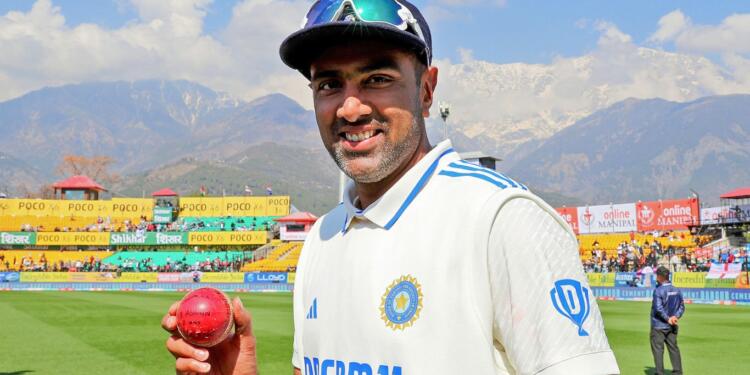There are greats, there are the greatest, and there are those who are in the second category but do not end up getting recognised as such by the authorities in power—even if they are former sportspersons. Ravichandran Ashwin was one of them.
When he was a batsman at the Under-17 level, Ashwin challenged batting authority. When he became a bowler, he hunted for the best in the business, and similarly, when he took on the all-rounder’s role, his rise was a challenge to Ravindra Jadeja’s stature as the first-choice all-rounder.
Like Rahul Dravid and KL Rahul, he did whatever the team asked him to do. When he was omitted from the limited-overs squad, Ashwin added more variations, like leg-spin, to his armoury. In the later stages, Ashwin’s work on batting is also attributed to the team needing him in clutch situations.
More than these accolades, Ashwin’s retirement is in the news for not-so-good reasons. Except for a few silent voices, no one is happy with the way he decided to retire—foremost among them is Indian captain Rohit Sharma. Ashwin was his opening partner at U-17 level, and both share a long-standing bond.
When Rohit was not there in the Perth Test, Ashwin was out of the squad and had decided to hang up his boots. It was Rohit who convinced his two-decade-old friend to play in the Pink Ball Test at Adelaide. Ashwin was not in the proper mindset but still played the game, and besides Bumrah, was the only bowler to concede less than three runs per over in the match.
“He was very sure about what he wanted to do. The team has complete backing of his thought process. Obviously, there is a bit of a gap now. For us as a team to regroup and collect our thoughts on this is very crucial right now. We have got some time in between, so we can think about how we need to proceed further. Speaking about Ash, he was very sure about this decision,” said Sharma.
The question is, why was Ashwin so sure in the middle of the series? He is India’s second-highest wicket-taker and the best off-spin bowler. The man was chosen to play all five Test matches of the series. After the GABA test, India had two more matches to play at the Melbourne and Sydney Cricket Grounds.
These are two of the biggest stadiums and also provide turning tracks—so much so that it is quite possible to field two spinners in a game. The probability of Ashwin playing in these two matches was higher than in the first three.
But Ashwin, the man, has some hard bones in his body. He was constantly being ignored in away series, and when it came to ignorance in Australia, where he played a key role in scripting a 2-1 series win in 2021, it was too much for Ashwin. Possibly, what hurt Ashwin was the lack of communication.
Imagine this: You have three seniors. The one in charge of putting you in the team assures you of full-time employment. Then it comes to the team lead, and he also does the same. But the manager has some apprehensions about your presence, as he thinks a young kid would be better for the future.
Any sports journalist worth his salt knows that Ashwin would have absolutely no issues with picking Washington Sundar or Ravindra Jadeja over him. What he feels bad about is the lack of coherent communication from the BCCI, Selection Committee, and Team Management.
Humiliation is the word his father used for possible reasons behind Ashwin’s retirement. Sports journalists like Nikhil Naz and Bharat Sundaresan have chosen to keep a hinting silence on the issue.
However, Kapil Dev, the man whose captaincy gave cricket the glory it enjoys now, openly said that he would not let Ashwin go like this.
Whether it’s the lobbying in the BCCI or the Coach-Captain-Player rift, Ashwin leaving the stage is not a pleasant sight to watch. Not even Jos Buttler—the man mankaded by Ashwin—or Ben Stokes—Ashwin’s bunny—would enjoy that.
But sports—especially cricket—is like that. Except for rare exceptions like Sachin Tendulkar, Sourav Ganguly, and Steve Waugh, among others, very few have received a fitting farewell to be preserved for generations to watch.
The unfortunate ones include legends like Rahul Dravid, VVS Laxman, Virender Sehwag, Kevin Pietersen, and Dale Steyn, among others. Many greats like James Anderson and Alastair Cook had to negotiate their Swansong.
Ashwin did not want to do it. He was one of those great men who just enjoyed doing their work and going back home in peace. Back home, Ashwin would open his research and analytical mind and explore new ways to dismiss a batsman, set a new field, unsettle a batsman, or bowl bad deliveries in order to get wickets.
Yes, Ashwin is the one who hinted to the world that even conventionally bad deliveries can give you wickets. In a talk show, Ashwin elaborated on how he got Sehwag out by bowling ‘rubbish’ balls since Sehwag was too good against sharp off-spins. The psychological way of dealing with the ego of a batsman in a way he wouldn’t notice is something only Ashwin could do.
When whacked by Glenn Maxwell in the IPL, Ashwin would again bowl him rubbish balls in the next match and blow sand dust after dismissing him. In the 2015 World Cup semi-final, he would again challenge Maxwell’s ego by placing a fielder and bowling flighted deliveries as an invitation to get smashed. The Aussie star was dismissed again.
He was particularly lethal against left-arm batsmen of all varieties. This is evidenced by the fact that Alastair Cook and David Warner—two batsmen of polar opposite nature—were among the top three of his most dismissals. The current English captain sits at the top of the list.
India will certainly replace him with strong bench strength. Playing XI is also not a problem for the management. The problem is finding Ashwin 2.0. The problem is finding Ashwin, who can sit in a lab like a research geek and use the results to take wickets.
The problem is finding a brain that can predict a wide ball in the most crucial situation and leave it. The problem is finding another thinker. The problem is finding another cricketer who does not play for money.
For the future, the biggest problem is convincing future cricketers that the cricket board will take care of their self-respect.


























